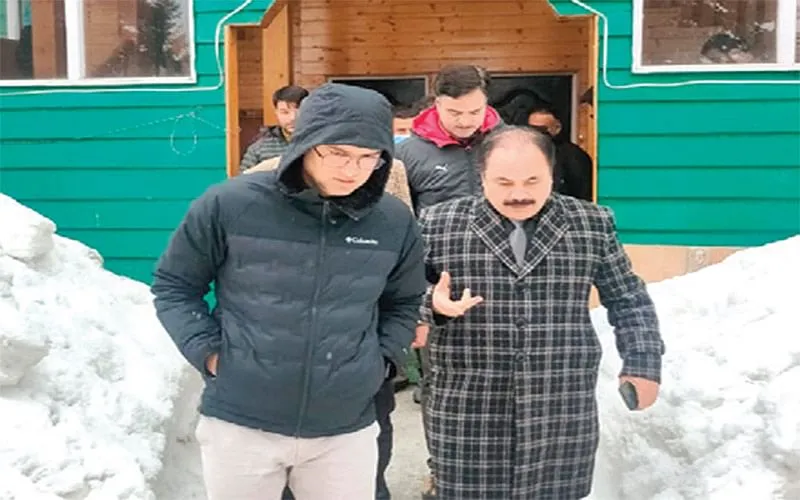Dr Shafqat Khan, Additional Mission Director Ayushman Bharat Digital Mission J&K in an exclusive interview with the Greater Kashmir’s Health Correspondent Rabiya Bashir talks about Ayushman Bharat Digital Mission (ABDM) and its benefits, challenges, strategies and future plans to implement ABDM successfully in the valley.
What is Ayushman Bharat Digital Mission?
Dr Shafqat Khan: Ayushman Bharat Digital Mission (ABDM) is a flagship programme of the government of India and it envisages merging the entire health ecosystem on a digital platform. This digital initiative creates a unique health ID for every citizen including digital healthcare professionals and facilities registry. The digital health IDs will help hospitals, insurance firms, and citizens access health records electronically when required. It will be a game changer for the health sector in J&K. The core registries under the mission are Ayushman Bharat Health Account (ABHA) numbers, Healthcare Professionals Registry (HPR) and Health Facility Registry (HFR). People need to have ABHA ID to avail all healthcare services. Under HPR doctors will have to register themselves. All the documents including his credentials, qualifications will be verified. The HFR database will have all the records of all the country’s health facilities in both private and government health sectors.
What are the benefits of ABDM?
Dr Shafqat Khan: There are a number of benefits. People usually visit hospitals and carry documents, prescriptions and other records which burdens them. Some diseases need all historical records as well. Usually, patients do not keep track of their records and information regarding what happened to them 10 years back. Now, with the help of digital mode, doctors will know the patients’ medical history with just a click on the computer. People will be able to know all the services, and availability of medicines online. ABDM is building a digital ecosystem for ease of access to the patients. They will be able to have a repository of the entire health records. People could avail a large number of health services. From teleconsultation with a doctor to availing services of a lab or transferring test reports and health records digitally to the doctor, all these services would be available on a single platform. It will ensure ease of doing business for doctors and hospitals and healthcare service providers.
How would people register themselves on a digital mode? What is ABHA?
Dr Shafqat Khan: To be a part of ABDM, people need to register on Ayushman Bharat Health Account (ABHA) which is available online or ABDM website. We also register patients in the hospitals. ABHA number is a 14-digit number that will uniquely identify you as a participant in the digital healthcare ecosystem. ABHA number will establish a strong identity which will be accepted by healthcare providers and payers.
The unique IDs would ensure patients access to their documents, services etc.
What are the challenges?
Dr Shafqat Khan: Definitely, there are multiple challenges like effective implementation, convincing people and other issues. People in some areas have low access to smartphones, so that is a big challenge. For this, we need to do capacity building, information, education and communication programmes with all the stakeholders in the ecosystem. Be it patients, doctors, healthcare providers in the government or private sectors, we have to raise awareness among all. Initially digital mode was not easy for people. But once they realise the benefits of technology, they will use it. This digital mission for delivery of health services will be much more affordable, easy, will cost less in transport, and other facilities.
How do you plan to implement the mission in areas where there’s poor connectivity?
Dr Shafqat Khan: We have understood that we need to have robust Wifi hospitals. We want a unified bandwidth. We will prefer optic fibre cable. We will definitely look at the company’s efficiency as well. We have already talked to our secretary regarding the installation of Wi-Fi connectivity at the hospitals.
How will you ensure data safety?
Dr Shafqat Khan: All the data will be safe and secure. It is federated data architecture and there will be no data collection on this platform. Even hospitals can access data after the consent of the patient. In fact, data regarding doctors, nurses, health care workers, hospitals, etc are secure and safe with us.
What is Healthcare Professionals Registry (HPR), ABHA Mobile App (PHR) and Unified Health Interface (UHI)?
Dr Shafqat Khan: HPR is a comprehensive repository of all healthcare professionals involved in delivery of healthcare services across both modern and traditional systems of medicine. Enrolling in the Healthcare Professionals Registry will enable them to get connected to India’s digital health ecosystem. A PHR is an electronic record of health-related information on an individual that conforms to nationally recognised interoperability standards and that can be drawn from multiple sources while being managed, shared, and controlled by the individual. The most salient feature of the PHR, and the one that distinguishes it from the EMR and EHR, is that the information it contains is under the control of the individual.
UHI is envisioned as an open protocol for various digital health services. UHI Network will be an open network of End User Applications (EUAs) and participating Health Service Provider (HSP) applications.
UHI will enable a wide variety of digital health services between patients and health service providers (HSPs) including appointment booking, tele-consultation, service discovery and others.
While this is going to be game changer for Health care practitioners and Health workers in achieving the Ease of Living and Ease of Doing Business at the workplace but the citizens should play an active role as they would be not only the stakeholders but also the beneficiaries of the Digital Health Mission for the smooth, hassle-free delivery and zero out of pocket expenses of Health care to them and their families.






